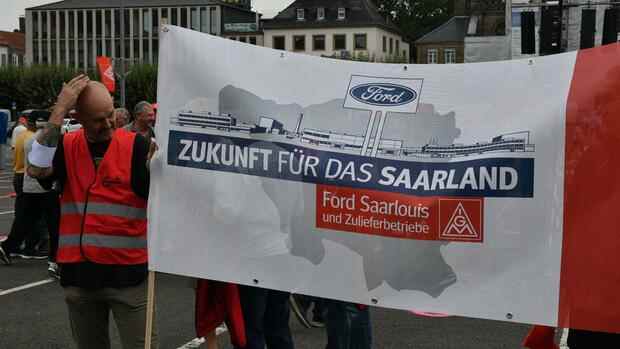Last year, Ford employees demonstrated for the preservation of their plant.
(Photo: imago images/BeckerBredel)
Ford Europe is facing a difficult year. In the middle of the year, the US group wants to decide where another car plant will be closed on the continent. Saarlouis or Valencia are available. 5,000 jobs are likely to be lost immediately at Ford. Additional cuts are then also unavoidable for the suppliers.
Of course, there are now great concerns in Saarland that the small federal state could become a social case after the Ford factory closes. 5,000 jobs for a million inhabitants is a lot. That is why politics got involved in order to somehow ensure the continued existence of the factory in Saarlouis. The federal government should also help; Government support for Ford is now being considered.
But politicians in Saarland must also prepare for plan B – that is, Ford will actually decide to give up Saarlouis in the summer. The US group has been shrinking in Europe for years. With the last austerity program alone, around 10,000 jobs were cut.
The sales figures are falling almost inexorably, last year the minus was almost 20 percent. Against this background, there is probably no alternative to Ford completely giving up one of its four European car plants.
Top jobs of the day
Find the best jobs now and
be notified by email.
Ford has also opted for full electrification of its European vehicle fleet. From 2030 onwards, only purely electrically powered cars will be sold here. There will not even be plug-in hybrids with combustion engines and electric motors anymore.
>>Read here: IG Metall wants to save the Ford plant in Saarlouis
With this electric offer, Ford will no longer achieve the necessary sales figures to permanently utilize all four plants in Germany, Spain and Romania. The group is already having problems filling the factories with enough attractive models.
A look to Bochum is worthwhile
Ford should not want to give up the location in Romania, if only because of the extremely favorable cost situation compared to Western Europe. Spain still has a certain wage cost advantage over Germany. So speaks more for Valencia and less for Saarlouis. In addition, there is already a commitment to keep the main plant in Cologne permanently. It is therefore very unlikely that both German locations will remain.
For politicians and trade unions, however, it is worth taking a look at Bochum, where Opel also closed a car factory almost ten years ago. More jobs have now been created on the former factory premises than there were in the Opel days. So there is always a future without a car manufacturer.
More: Ford is apparently investing up to an additional $20 billion in electric cars.
